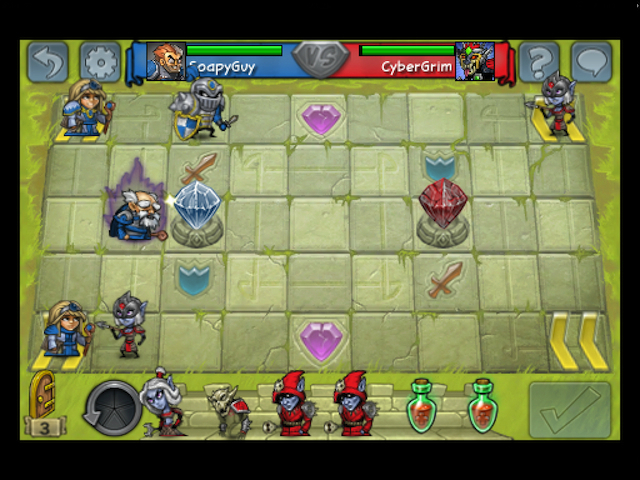
Hero Academy
Game play - 5
Presentation - 7
Story / Creativity - 5
Lifespan - 3
5
There are some great things I see in Hero Academy. I like how it reminds me a lot of Chess and Magic: The Gathering being fused together in an awesome package. I'm not even a big fan of multi-player games and I still had moments of fun with this game. But with the lack of single-player modes with an AI enemy, or a timer-system to shorten down the length of turns you could end up waiting for a long time for a simple match to end. $5 USD is not much to ask for a game like Hero Academy, and it does a lot of things very well; but this is only recommended if you got friends willing to sit in front of their PC to play it with you.
I really wish there was more turn-based games like Hero Academy.
Coming out last year in November for the iOS, the game has a great deal of charm in its aesthetics. The game also has a surprisingly good core mechanics that rewards a great deal of strategy and tactics. Recently Robot Entertainment decided to release the game with the Team Fortress 2 cast as a free DLC to the PC version. Is Hero Academy worth it on the PC? What probably was a fun game to pass the time on a mobile device has, unfortunately, transitioned to a dull experience for a PC game.
The best way to describe the game-play for Hero Academy is a mixture of Chess unit based system with Magic: The Gathering’s deck/hand system. At the start of the game you have a randomly shuffled deck of units, buffs (weapons and armor) and spells to use in your ‘hand.’ Using something from your hand costs one point from your turn, along with moving or attacking with a unit. Your goal is to wipe out the other side so they have no more units or destroying their crystals.
Since this is a port of a mobile game, expect to play the game entirely through the mouse with left and right clicks. The interface is laid out well here with indications on how many turns you have left to how many cards are in your deck (the dungeon door showed in the lower-left corner). The game doesn’t wait in giving the tutorial to you as it will request if you want to go through it every time Hero Academy starts up. It is easy to skip, but could get annoying to some experienced players to the game. Plus the tutorial never told me that I could right-click on items on the board or in my hand to get a better description about the game.
Hero Academy’s is at its best when you play it multi-player – but also the game’s most dull moment. In order to get online for the PC you need to have a Robot Entertainment account, something that isn’t hard to create but might lead to some unwanted emails. If you got friends talking over Skype or Steam’s voice while playing the game it could be fun. However, waiting for a random person to join in the game takes awhile, and it could even slow down the game when waiting for the other person to finish their turn. It varies between each player, but in my case I must have waited ten or twenty minutes for a person to make a move. Time spent very bored with the game.
The game-play for Hero Academy might not be great for some players, but the aesthetics are charming. Every stereotype of a magic/medieval fantasy world is here: Wizards with long beards and staves; Dark elves working with necromancers; and warriors with 5 o’clock shadows. Each unit are drawn and animated very well with different facial features indicating their health. Plus there is visible changes to each unit when you apply a buff to them, like archers switching from a wooden bow to a golden bow.
While Hero Academy has the tropes of a fantasy game, don’t expect any story here. This isn’t a game to play if you are looking for any context explaining why the Council are fighting against the Dark Elves. It’s kind of a pity as the sense of humor presented through the aesthetics might work well in a ‘Visual Novel’ style narrative. However since this is primarily a multi-player game then single-player elements like story would be neglected.
Hero Academy still has a great deal of depth for a creative player to look through. With it being on Steam you can have the Team Fortress 2 team along with the three other teams to play as. Each team brings in their own units offering their own strategies to develop. Combine these units with the buffs and you could find a lot of combos to develop.
But like a fighting game, Hero Academy requires you to unlock some of the teams to play in multi-player. What is even worse is that you don’t unlock these teams through single-player or by a ranking system applied to multi-player, but through DLC. The cost of each team is not bad (about $5 USD each), but I could see this annoying some players.
How long Hero Academy could keep you occupied depends primarily on your friend list than the game itself, unfortunately. With the heavy requirement of the multi-player and little features to keep a player entertained in single-player, the game is a great time when you play it with friends. I can definitely see anyone that likes Chess or Magic: The Gathering having a lot of fun with the game. With Steam’s voice over feature and considering the price for the game alone (about $5 USD), you could get a lot of fun with this gem.
But the game is boring to play when you pick a random person. With no timer to keep track of how long turns could be you will be spending a great deal of time just waiting for your opponent to make a move. You could have multiple sessions running with different people in the game, but I imagine this will get confusing. Top this off with little single-player content and questionable DLC business practices and it feels like a really cheap game for the PC.


